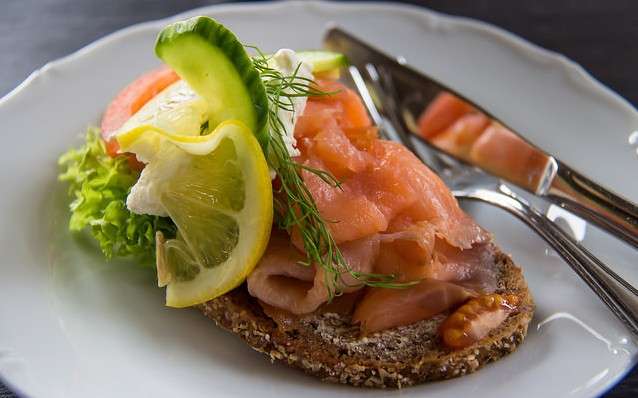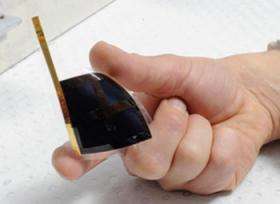Another Benefit of Fish Oil: Reduces Weight Gain From Fatty Foods
Adding fish oil to your diet can boost microbes that may prevent weight gain.

Adding fish oil to your diet can boost microbes that may prevent weight gain.

For 6 years, 18-year-old Alex Deans has been working on a device known as the iAid, a navigation system that uses GPS to help the blind give up their canes.

Scientists have developed a new fiber from fruits like pineapples and bananas that is almost as strong as Kevlar, the fiber used in bulletproof vests. The new "nono-cellulose" fiber will help bring in an era of plastics that are stronger, lighter (which will improve fuel efficiency in cars), and more environmentally friendly than those in use today.

After joining a clinical trial at Boston Children's Hospital, Katie Mills started to speak in complete sentences for the first time, her 30-second attention span extended into minutes, and she was finally able to retain information from one day to the next, said her mother, Susan Mills. "We'd had a child who had basically been 2 years old for four years," said Mills, of Whiteville, N.C. But after four months, "she was communicating in ways she had never done before. It was amazing. It was like it was a totally different child.

A much cheaper fuel cell could be on its way thanks a new cathode built by Australian researchers made of special polymer plastic instead of expensive platinum, which conducts electricity equally well and is more stable.
Described as a cross between a house cat and a teddy bear, scientists announced the identification of a new mammal species, the olinguito. In the raccoon family, Bassaricyon neblina is the first mammalian carnivore species to be added in the Americas in 35 years, scientists at the Smithsonian Institution in Washington said. The 2-pound olinguito (oh-lin-GHEE-toe), with its large eyes and woolly orange-brown fur, is native to the cloud forests of Colombia and Ecuador.
Energy Undersecretary David Garman told a Senate panel that the partnerships to develop hydrogen are "on track" to meet technical goals within the next nine years and to have hydrogen fuel cell vehicles in showrooms by 2020.
A new vaccine due out in 2017 is almost completely effective against the shingles virus and doesn't lose its effectiveness over time like the current one.
Extra olive oil added to a diet rich in fruits, vegetables, nuts, and fish reduces the risk of breast cancer by 68% compared to a low fat diet.
A photographer packs four hours into a minute-and-a-half with a stunning time lapse of the supermoon lunar eclipse
Japan is preparing to bolt turbines onto barges and build the world's largest commercial power plant using floating windmills off the coast of Fukushima, to help cut its reliance on atomic energy.
People a mile apart were able to read minds in a guessing game by having their brains wired together.
A 16-yr-old girl won the Google Science Fair with a test kit she invented that is cheap, easy to use in Africa, and takes 30 minutes to diagnose Ebola.
Tech giant Microsoft will spend millions over the next three years to help high schools hook students on computer science as a career.
A study of 96,000 children shows that the chances of a child developing autism is the same whether they receive the measles-mumps-rubella (MMR) vaccine or not.
Brazil's first astronaut docked at the International Space Station. In Brazil, his family and countrymen are overcome with pride.
Following the sun across the nation, a crew of young filmmakers got a first-hand look at how solar is working for Americans, reducing utility costs for diverse users like a boat marina, fire station, zoo and the Crayola Crayon factory.
Scientists in Denmark have built a device designed to clean polluted air by accelerating natural atmospheric processes, helping to get rid of chemicals and smells. That Atmospheric Photochemical Accelerator developed at Copenhagen University underwent six years of trials working atop a stinky industrial plant.
Researchers have found an eco-friendly alternative to the metal ores currently favored in the electrodes of lithium-ion batteries. The new non-toxic and sustainable battery uses purpurin, a red/yellow dye extracted from the root of the madder plant.
A next-generation material first earmarked for use in electronics has proven itself a capable clean-up agent for polluted waters. Boron nitride, or white graphene, can soak up organic pollutants such as industrial chemicals or engine oil in incredible amounts for their size, according to a report in Nature Communications.
Recent Stories
A Heartfelt Reminder to Appreciate the Ones We Love
Cherish the Woman Who Stands by You
Breaking Generational Cycles of Pain
Living by Your Own Values, Not Others' Approval
When Life Brings Rain, It’s Okay to Rest
Before You Judge Someone's Life, Take a Moment to Walk in Their Shoes.
A Friend Who Spreads Gossip is Not a True Friend at All
The Value of Human Connection Over Digital Convenience
The Quiet Kind of Love
One Day, Your Mom Won’t Call You Anymore
I’ve reached a point in my life...
Happiness is a mindset, a conscious choice we make every day